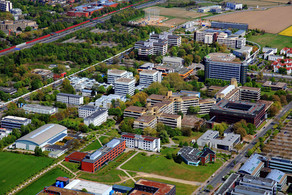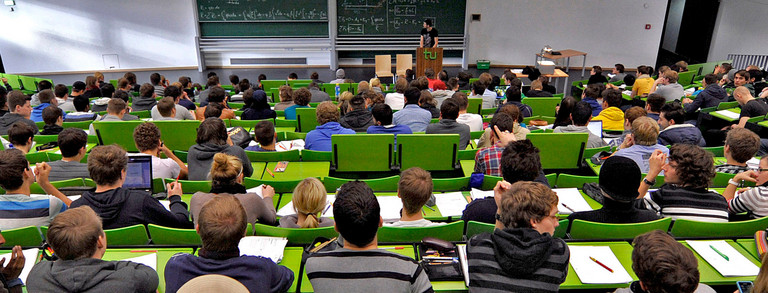Studies With Reference to Sustainability
Some degree programmes at TU Dortmund deal with aspects of sustainability from within their subject area, which is reflected in lectures and modules or areas of specialisation as well as research topics. Currently, there are no degree programmes that identify exclusively with the topic of sustainability or have this in their name.
The following is an overview of the degree programmes that deal in depth with social, economic and ecological sustainability. Individual modules or courses can usually be found on the pages of the faculties or in the listing of sustainable courses.
Please be aware, that most of the degree programms are provided only in german. For information about the language check the main page or get in contact with the faculties.
The Architecture and Urban Planning degree programme prepares students for the construction of buildings under building law, technical, economic, ecological, political and historical aspects.
In the Master's degree programme, one can qualify in the field of construction planning and gain in-depth artistic, scientific and technical knowledge.
In the specialisation area 'Resource-efficient building' of the Master's degree, planning principles are examined under sustainable and energy aspects and their influence on architecture and building construction, and are further developed in terms of design and function.
Bachelor Architecture and Urban Design
Master Architecture and Urban Design with specialisation 'Resource-efficient building'
Civil engineers plan, calculate and construct load-bearing structures. In doing so, they use their technical-constructive knowledge and take into account the physical properties of materials and various construction methods. In the Dortmund model project, prospective civil engineers learn together with students of architecture and urban planning in order to strengthen interdisciplinary cooperation.
The Master's programme in Civil Engineering provides in-depth technical-scientific knowledge for the design and calculation of constructions and load-bearing structures. In the specialisation area 'Resource-efficient construction', students deal with the constructive, technical and, in particular, physical interrelationships of buildings. Against the background of holistic, integrative design and planning principles, sustainable and energetic aspects as well as their influence on the supporting structure, the construction and the choice of materials are to be examined and further developed in terms of design and function. The ability and understanding of the analytical examination of the built environment in connection with energy efficiency and resource-saving use of materials is a prerequisite.
In bioengineering and chemical engineering, people are in demand who seek engineering technical solutions for the small and large problems of our lives: It is about clean laundry, clean water and clean air, but also about the production of paint, cosmetics, medicine, fertiliser or new forms of energy.
Since last year, the group of Bioprocess Engineering has been offering a public lecture series entitled 'Klima: Wandel, Werte, Wissenschaft' (eng. Climate: Change, Values, Science). Many external scientists are invited to talk about their research areas, which deal directly with the causes, problems and solutions of climate change. The lecture is the basic module for the studium oecologicum certificate, which the TU has been offering since the winter semester 2021/22. Currently the lecture is provided only in german.
Today, new findings in science, business, administration and technology almost always arise from large and complex amounts of data. For the proper handling of patient or customer data, share prices and returns as well as weather or climate information, knowledge of statistics, computer science and mathematics is required. These subjects are combined in the Data Science degree programme. Students gain the ability to conduct statistical data analyses and at the same time gain deeper insights into concepts and methods of computer science.
In the Statistical Science programme, students deal with separating chance from system, inferring from samples to populations, identifying causal relationships or finding small needles in large haystacks.
The Electrical Engineering and Information Technology degree programme deals with issues from a wide range of technical fields. These range from energy conversion and transmission to automotive electronics and the development and processing of microchips to data communication.
Within the scope of the degree programme, students can comprehensively deal with topics related to energy generation, transmission and conversion. Especially since the power grid must be extensively expanded for a climate-neutral economy, these competences are important for a sustainable future.
Some appropriate modules are also listed in the sustainable courses catalogue .
Spatial planning is an interdisciplinary field of engineering that deals with the spatial development of living, working and environmental conditions. The different spatial levels range from the residential environment and neighbourhood to the urban district, the city as a whole, the region, the state and federal levels and even the European and international levels.
The task and goal of spatial planning is to analyse different requirements, conflicts and opportunities in space and, based on this, to point out concepts, solutions and strategies and to accompany their implementation. Current or future problem situations are dealt with in a forward-looking manner.
In the study of spatial planning, one can deal with many aspects of sustainability. These include topics such as future urban and transport concepts, migration, landscape ecology or climate impact adaptation. There are a large number of modules offered, some of which can also be taken in the studium oecologicum certificate.
The international Master's programme SPRING deals with spatial planning in regions with growing economies and populations, including countries of the Global South.
During their studies, students learn about the challenges of rapidly growing urban populations, reflect on conflicts between the economy and the environment, and design sustainable infrastructure and strategies for climate impact adaptation.
It is an international degree programme that can be completed in the first year at the TU and in the second year at an international partner university in Chile, Ghana, Brazil, Tanzania or the Philippines.
The programme deals (in)directly with the consequences of climate change for developing countries and analyses concepts that will shape future societies and infrastructures.
The Rehabilitation Science programme is a Master's programme in which students gain knowledge about fields of work with rehabilitation education requirements in an inclusive society. The programme is closely linked to social sustainability as it deals with rehabilitation and inclusion of, among others, people with disabilities in our society.
Some modules in rehabilitation science deal directly with inclusion, health and human rights and can also be partially credited in the studium oecologicum certificate. The modules can be found in the catalogue of sustainable courses.




